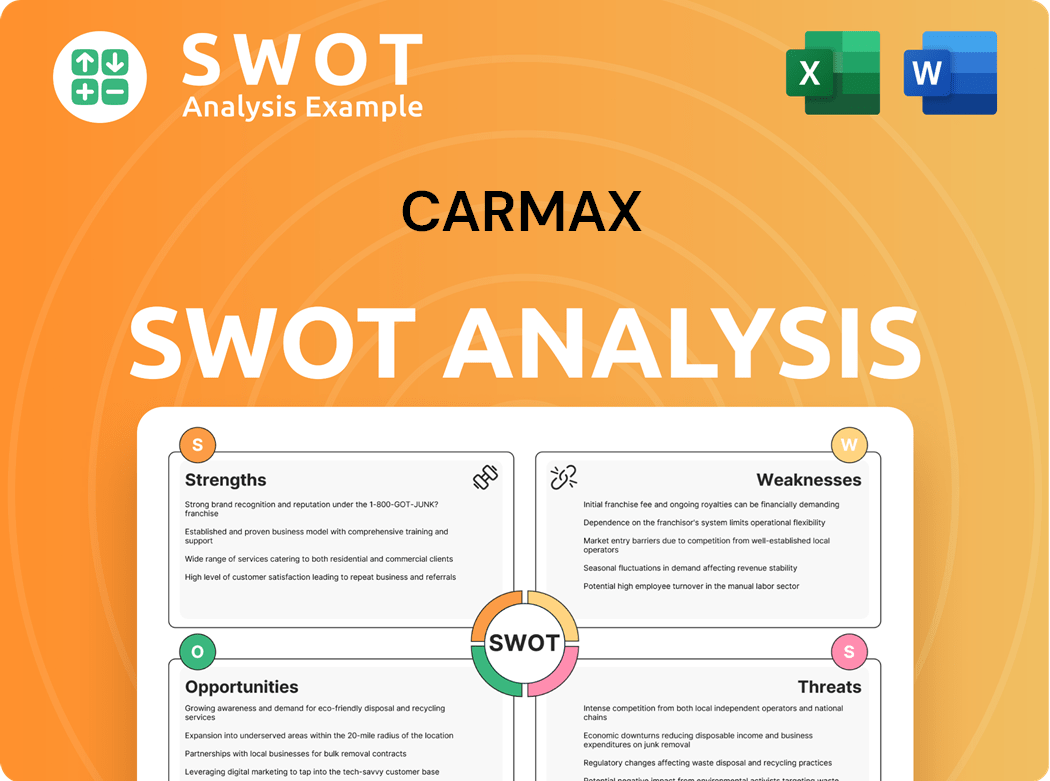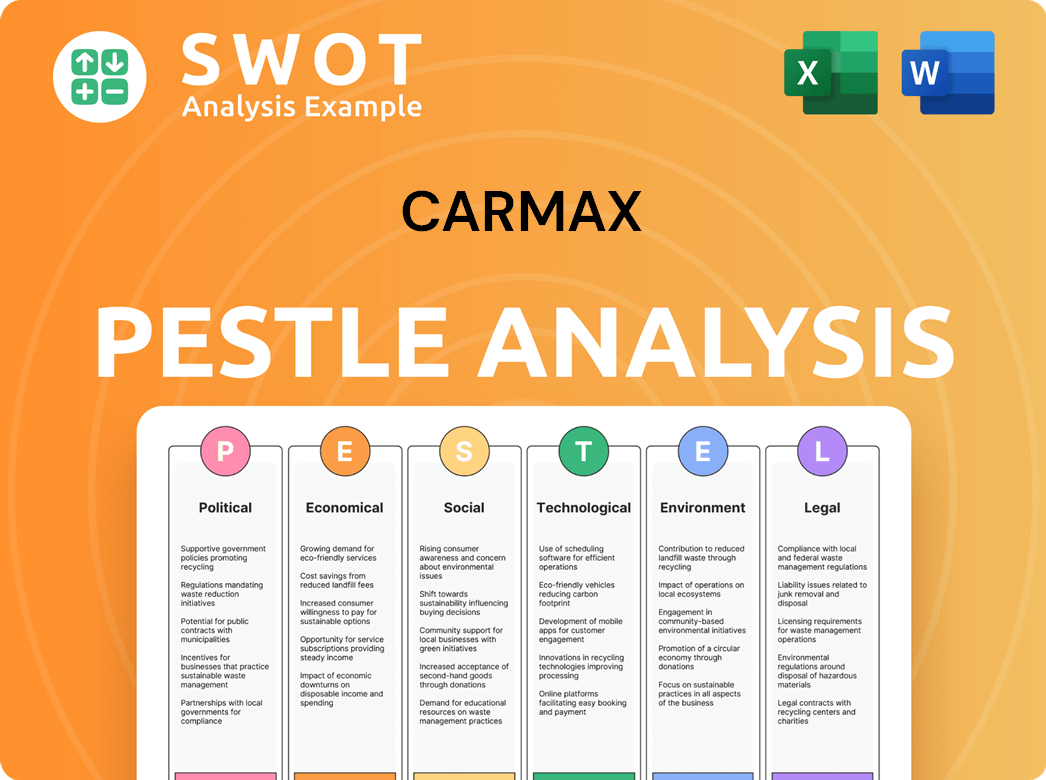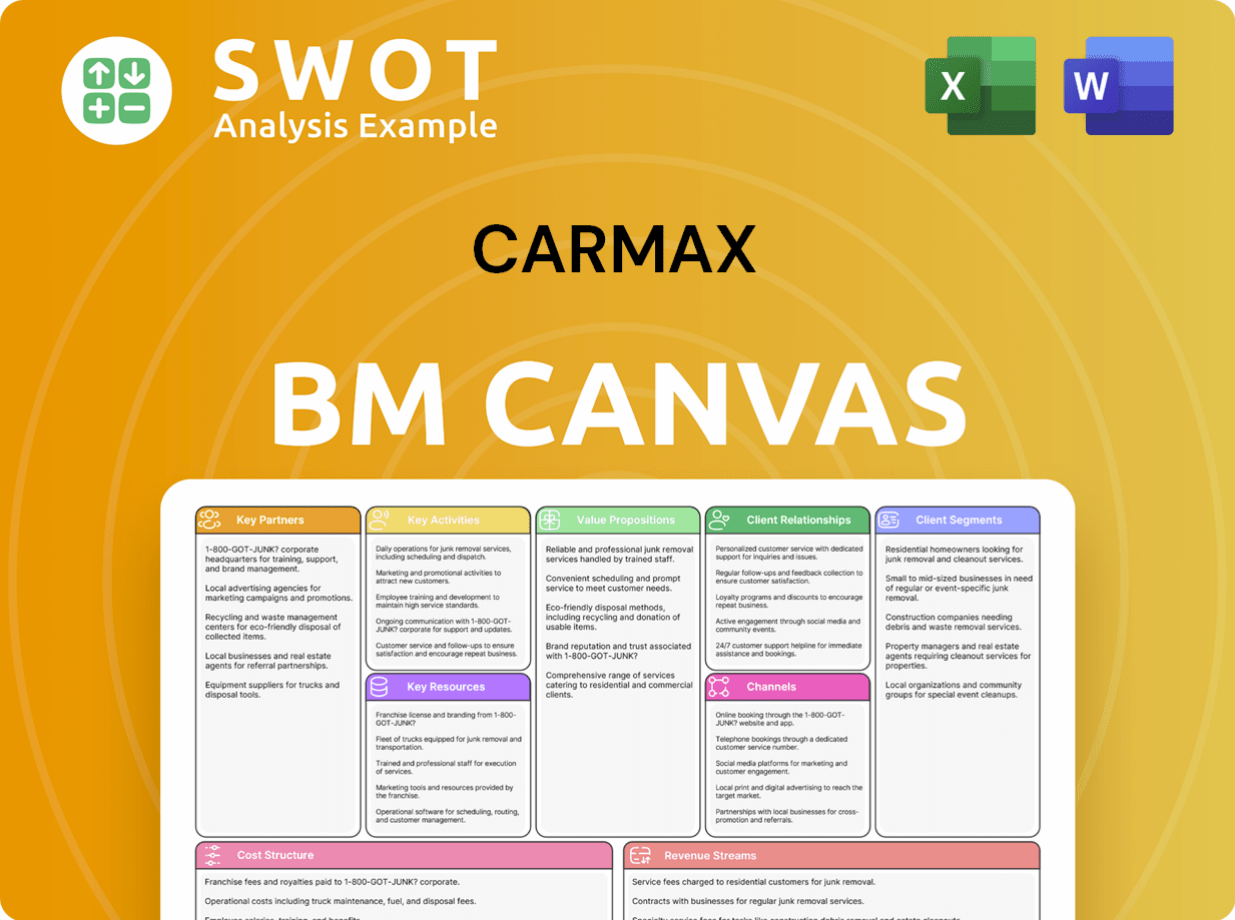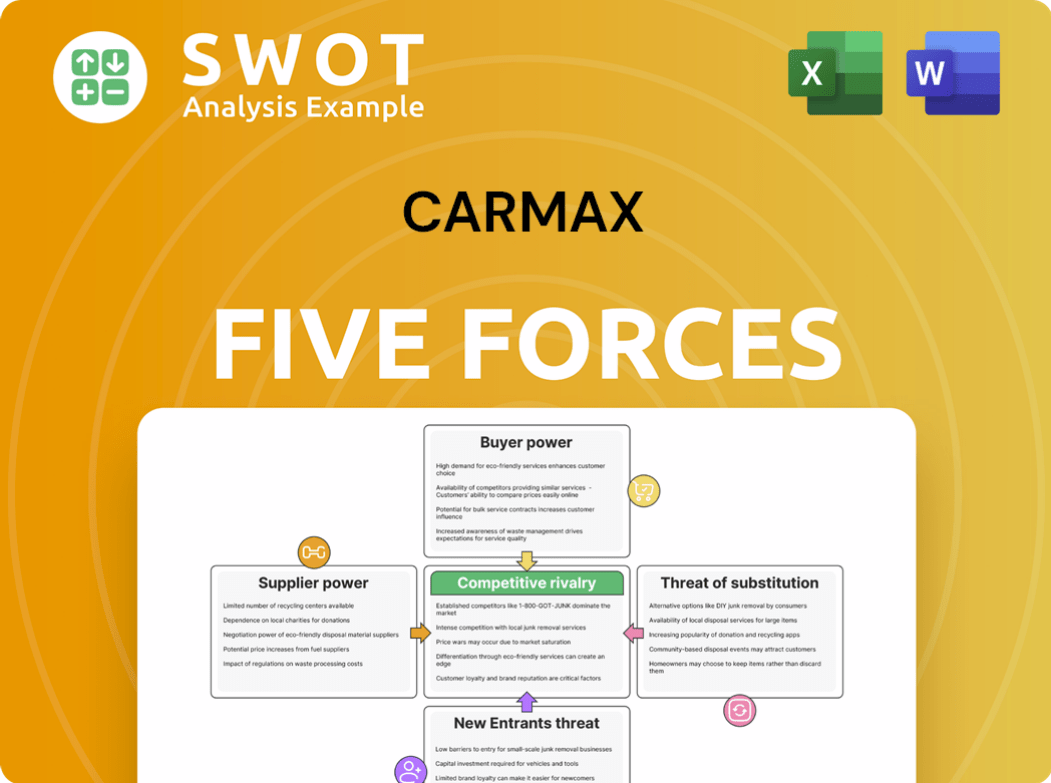CarMax Bundle
Who Really Calls the Shots at CarMax?
Ever wondered who's steering the wheel at the nation's largest used car retailer? Understanding CarMax SWOT Analysis and its ownership structure is key to grasping its market position and future prospects. From its roots as a Circuit City spin-off to its current status as a publicly traded powerhouse, CarMax's ownership story is a fascinating tale of strategic shifts and financial evolution. This deep dive unveils the key players and influences shaping the company's destiny.

The question of "Who owns CarMax?" goes beyond simple stock ownership; it's about understanding the forces driving its strategies. Knowing the CarMax parent company and the influence of major shareholders helps to interpret the company's decisions and anticipate its future moves. This exploration of CarMax ownership will reveal the individuals, institutions, and historical events that have shaped the company into the industry leader it is today, providing critical CarMax company information.
Who Founded CarMax?
The origins of the company, now known as CarMax, trace back to 1991. It was conceived as 'Project X' by executives at Circuit City Stores, Inc., a major player in the consumer electronics market at the time. The vision was to revolutionize the used car market by applying the 'big-box' retail model, emphasizing a wide selection, high volume, and transparent pricing.
Richard L. Sharp, then CEO of Circuit City, and Austin Ligon, who served as Senior Vice-President of Corporate Planning, were key figures in the company's creation. Ligon later became the first president of CarMax. Their combined expertise and strategic foresight laid the groundwork for what would become a leading player in the automotive retail industry.
The initial funding for CarMax came directly from Circuit City, which invested around $170 million to develop the concept and establish the first stores. The first CarMax store, 'CarMax: The Auto Superstore,' opened in Richmond, Virginia, in October 1993, operating as a wholly-owned subsidiary of Circuit City. The company's early success was built on this foundation of corporate backing and a customer-centric approach.
The initial ownership of CarMax was straightforward, as it was a subsidiary of Circuit City. Therefore, the CarMax ownership was essentially held by Circuit City. Key figures like Richard L. Sharp and Austin Ligon were instrumental in its founding. There is no readily available information on initial ownership disputes or specific early agreements. The company's early structure was deeply integrated within its parent corporation.
- Circuit City provided the capital and infrastructure for CarMax's early development.
- Austin Ligon, as the first president, played a crucial role in shaping the company's strategy.
- The initial focus was on establishing a strong retail presence and refining the business model.
- The early years were marked by rapid expansion and the establishment of a new standard in the used car market.
CarMax SWOT Analysis
- Complete SWOT Breakdown
- Fully Customizable
- Editable in Excel & Word
- Professional Formatting
- Investor-Ready Format

How Has CarMax’s Ownership Changed Over Time?
The evolution of CarMax's ownership is a key part of its history. Initially a subsidiary of Circuit City, the company began trading publicly in 1997 as a tracking stock. This allowed CarMax to tap into public markets for capital, fueling its expansion. The most significant change occurred in October 2002 when CarMax was spun off entirely from Circuit City, becoming an independent, publicly traded entity on the New York Stock Exchange (NYSE) under the ticker symbol KMX. This move granted CarMax greater operational independence, allowing it to focus on its core business of used car sales.
Today, CarMax is a publicly traded company with a market capitalization of approximately $10.07 billion USD as of June 9, 2025. The ownership is largely distributed among institutional investors, who hold a substantial portion of the shares. Individual investors and company insiders own smaller percentages of the company's stock. Understanding the ownership structure provides insights into the company's strategic direction and financial stability. For more information about the company's customers, you can read about the Target Market of CarMax.
| Ownership Category | Approximate Percentage (as of April 2025) | Approximate Percentage (as of March 2025) |
|---|---|---|
| Institutional Investors | 92.09% - 99.5% | 92.09% - 99.5% |
| Individual Investors | 6.0% - 7.44% | 6.0% - 7.44% |
| Insiders | 0.365% - 2.46% | 0.365% - 2.46% |
The major stakeholders in CarMax include significant institutional investors. The Vanguard Group, Inc. is the largest individual shareholder, holding approximately 11.85% or 18.09 million shares. Other key institutional investors include BlackRock, Inc. (7.92% or 12.09 million shares), Principal Financial Group Inc. (4.31% or 6.59 million shares), State Street Corp (4.07% or 6.21 million shares), and Diamond Hill Capital Management Inc. (3.84% or 5.86 million shares). The institutional ownership has seen a slight increase from 109.67% to 109.69% in March 2025, while mutual fund holdings decreased from 79.22% to 77.24% in the same period. These investors play a crucial role in shaping the company's strategic decisions.
CarMax's ownership structure has evolved from a subsidiary to an independent, publicly traded company.
- Institutional investors hold the majority of CarMax shares.
- The Vanguard Group is the largest individual shareholder.
- The company's structure allows for strategic focus and access to capital markets.
- Understanding the major shareholders can provide insights into the company's direction.
CarMax PESTLE Analysis
- Covers All 6 PESTLE Categories
- No Research Needed – Save Hours of Work
- Built by Experts, Trusted by Consultants
- Instant Download, Ready to Use
- 100% Editable, Fully Customizable

Who Sits on CarMax’s Board?
As of the 2024 Annual Meeting of Shareholders on June 27, 2024, the Board of Directors of CarMax consisted of ten members, each elected to serve a one-year term expiring at the 2025 Annual Meeting. The Board operates with a majority vote standard for director elections in uncontested scenarios. This means that each nominee must receive affirmative votes from a majority of the votes cast. The composition of the board includes individuals with backgrounds in finance, retail, and private equity.
The current board members include William D. Nash, who serves as President and Chief Executive Officer. Other re-elected directors for the term expiring at the 2025 Annual Meeting include Peter J. Bensen, Sona Chawla, David W. McCreight, Mark F. O'Neil, and Pietro Satriano. Mitchell D. Steenrod serves as the Lead Independent Director. Ronald E. Blaylock, a founder and Managing Partner of GenNx360 Capital Partners, has been a director since 2007. The Board also includes Shira Goodman and Marcella Shinder. CarMax maintains a largely independent Board, with 8 out of 10 director nominees being independent.
| Director | Title | Since |
|---|---|---|
| William D. Nash | President and Chief Executive Officer | N/A |
| Peter J. Bensen | Director | N/A |
| Sona Chawla | Director | N/A |
| David W. McCreight | Director | N/A |
| Mark F. O'Neil | Director | N/A |
| Pietro Satriano | Director | N/A |
| Mitchell D. Steenrod | Lead Independent Director | N/A |
| Ronald E. Blaylock | Director | 2007 |
| Shira Goodman | Director | N/A |
| Marcella Shinder | Director | N/A |
CarMax's voting structure is primarily one-share-one-vote. Corporate governance includes annual elections for all directors and a mandatory director retirement policy. At the 2024 Annual Meeting, shareholders approved a non-binding advisory resolution on executive compensation, indicating shareholder sentiment on governance. To understand more about the company's origins, you can read a Brief History of CarMax.
The Board of Directors oversees CarMax's operations, ensuring independent oversight. Shareholders vote annually on directors, with a majority vote needed for election. The company's governance structure aims for transparency and accountability.
- Majority vote standard for director elections.
- Annual elections for all directors.
- Non-binding advisory vote on executive compensation.
- Independent board members.
CarMax Business Model Canvas
- Complete 9-Block Business Model Canvas
- Effortlessly Communicate Your Business Strategy
- Investor-Ready BMC Format
- 100% Editable and Customizable
- Clear and Structured Layout

What Recent Changes Have Shaped CarMax’s Ownership Landscape?
Over the past few years, the ownership structure of CarMax has remained relatively stable, with a continued emphasis on institutional investors. In fiscal year 2025, the company reported net revenues of $6.0 billion for the fourth quarter, an increase of 6.7% compared to the prior year. The company's fiscal year 2024 revenue was $28.21 billion, indicating its financial strength. The company's share of the nationwide 0-10 year old used vehicle market held steady at 3.7% in calendar year 2024.
Recent trends show that institutional investors maintain a strong presence. As of March 2025, institutional holdings increased from 109.67% to 109.69%. Mutual fund holdings decreased from 79.22% to 77.24% during the same period. Insider ownership remained at 0.40% as of March 2025. These figures highlight the ongoing confidence of major financial institutions in the company. The Vanguard Group, Inc. and BlackRock, Inc. are among the largest shareholders, with Vanguard holding 11.85% and BlackRock holding 7.92% as of March 2025.
| Ownership Category | March 2024 | March 2025 |
|---|---|---|
| Institutional Investors | 109.67% | 109.69% |
| Mutual Funds | 79.22% | 77.24% |
| Insider Ownership | 0.40% | 0.40% |
The company has been actively repurchasing shares, with over $100 million in common stock repurchased during the first quarter of fiscal year 2025. In June 2024, the company launched its inaugural non-prime public asset-backed securitization deal. The company's focus on used electric vehicles is evident in its recent EV Trends Report (April 2025), which highlights a significant increase in consumer interest. The company aims to be a leader in used EV expertise and sales. For more detailed information about the company, you can read this article about CarMax's company information.
CarMax reported net revenues of $6.0 billion in the fourth quarter of fiscal year 2025, a 6.7% increase year-over-year. The company's fiscal year 2024 revenue was $28.21 billion, demonstrating its financial stability and growth. The company's share of the used vehicle market was 3.7% in calendar year 2024.
Institutional investors continue to hold a significant portion of CarMax's shares. As of March 2025, institutional holdings increased slightly, while mutual fund holdings decreased. Insider ownership remained stable at 0.40%. Vanguard and BlackRock are among the largest shareholders.
CarMax is actively repurchasing shares and launched its first non-prime public asset-backed securitization deal in June 2024. The company is also focusing on the used EV market, with consumer interest nearly doubling from January 2022 to February 2025.
The company's 2025 Responsibility Report emphasizes its commitment to sustainability and good governance. There have been no public statements about potential privatization or significant founder departures. CarMax is focused on growth and leadership in the used car market.
CarMax Porter's Five Forces Analysis
- Covers All 5 Competitive Forces in Detail
- Structured for Consultants, Students, and Founders
- 100% Editable in Microsoft Word & Excel
- Instant Digital Download – Use Immediately
- Compatible with Mac & PC – Fully Unlocked

Related Blogs
- What are Mission Vision & Core Values of CarMax Company?
- What is Competitive Landscape of CarMax Company?
- What is Growth Strategy and Future Prospects of CarMax Company?
- How Does CarMax Company Work?
- What is Sales and Marketing Strategy of CarMax Company?
- What is Brief History of CarMax Company?
- What is Customer Demographics and Target Market of CarMax Company?
Disclaimer
All information, articles, and product details provided on this website are for general informational and educational purposes only. We do not claim any ownership over, nor do we intend to infringe upon, any trademarks, copyrights, logos, brand names, or other intellectual property mentioned or depicted on this site. Such intellectual property remains the property of its respective owners, and any references here are made solely for identification or informational purposes, without implying any affiliation, endorsement, or partnership.
We make no representations or warranties, express or implied, regarding the accuracy, completeness, or suitability of any content or products presented. Nothing on this website should be construed as legal, tax, investment, financial, medical, or other professional advice. In addition, no part of this site—including articles or product references—constitutes a solicitation, recommendation, endorsement, advertisement, or offer to buy or sell any securities, franchises, or other financial instruments, particularly in jurisdictions where such activity would be unlawful.
All content is of a general nature and may not address the specific circumstances of any individual or entity. It is not a substitute for professional advice or services. Any actions you take based on the information provided here are strictly at your own risk. You accept full responsibility for any decisions or outcomes arising from your use of this website and agree to release us from any liability in connection with your use of, or reliance upon, the content or products found herein.